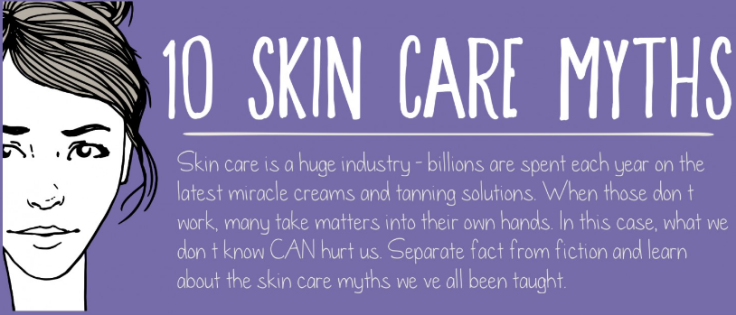Aging Skin Care Facts: 10 Common Myths That Need 'Clearing Up'

Skin care can be confusing; the latest buzz about new products, anti-aging treatments, and word-of-mouth advice can make it hard to separate fact from fiction. We spend billions each year on the latest miracle creams and tanning solutions to achieve “eternal youth,” but when these products don't work, we take matters into our own hands and potentially damage our skin cells. After all that, we rely on old wives' tales and other wacky advice to repair the damage, which ends up hurting our skin even more.
Neutrogena, a skin care, hair care, and cosmetics company, has dispelled the most common myths and misconceptions surrounding skin health and given us the facts to obtain healthier, clearer-looking skin in their infographic "10 Skin Care Myths."
Acne is one of the most common skin conditions, and affects about 17 million people in the U.S. Nearly 85 percent of people between the ages of 12 to 24 develop acne. One long-standing myth about acne involves vigorously scrubbing our face with soap to get rid of zits. Although washing cleans away surface oils, dirt, and dead skin cells, washing too often could risk drying out and irritating the skin. In other words, it will make your acne worse. Neutrogena suggests washing your face no more than two times a day gently with lukewarm water and a mild face wash, and patting it dry with a clean towel.
Another myth involves the use of so-called "all-natural" products for better results. Natural products can actually be worse because they're not protected from microbes. Organic and all natural compounds rarely differ from their synthetically produced counterparts, so just because an ingredient grows out of the ground it doesn't mean it's good for your skin. The ideal skin products blend natural and synthetic ingredients.
Take a look at the infographic below, and separate fact from fiction as you learn about skin care myths that can age and damage your skin.




























